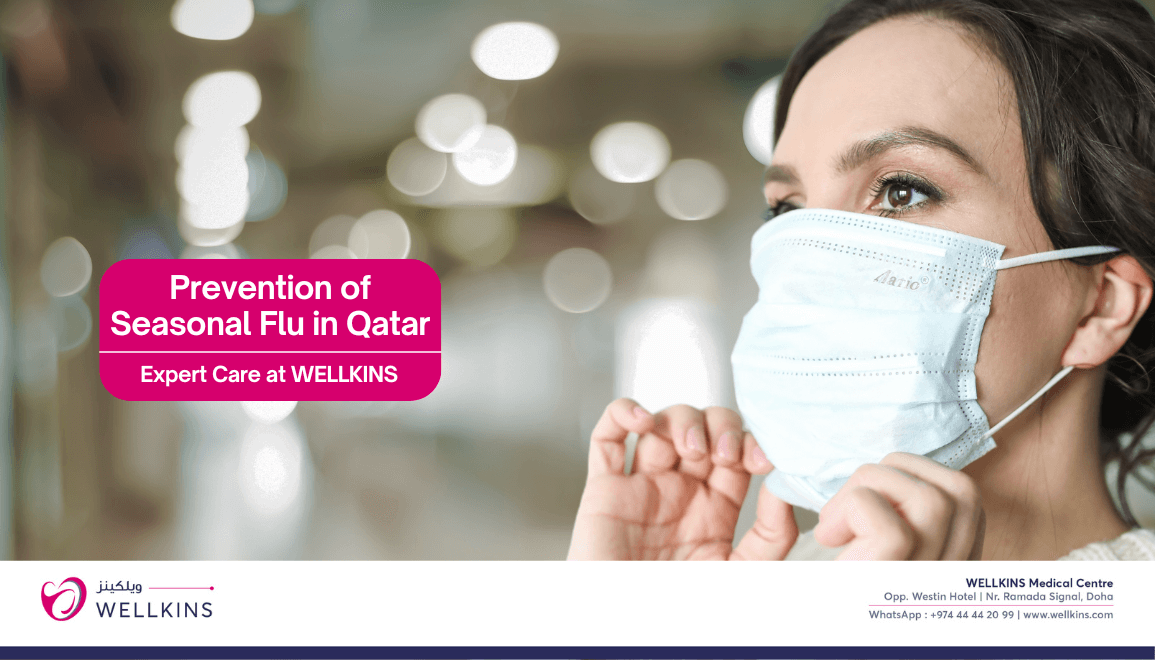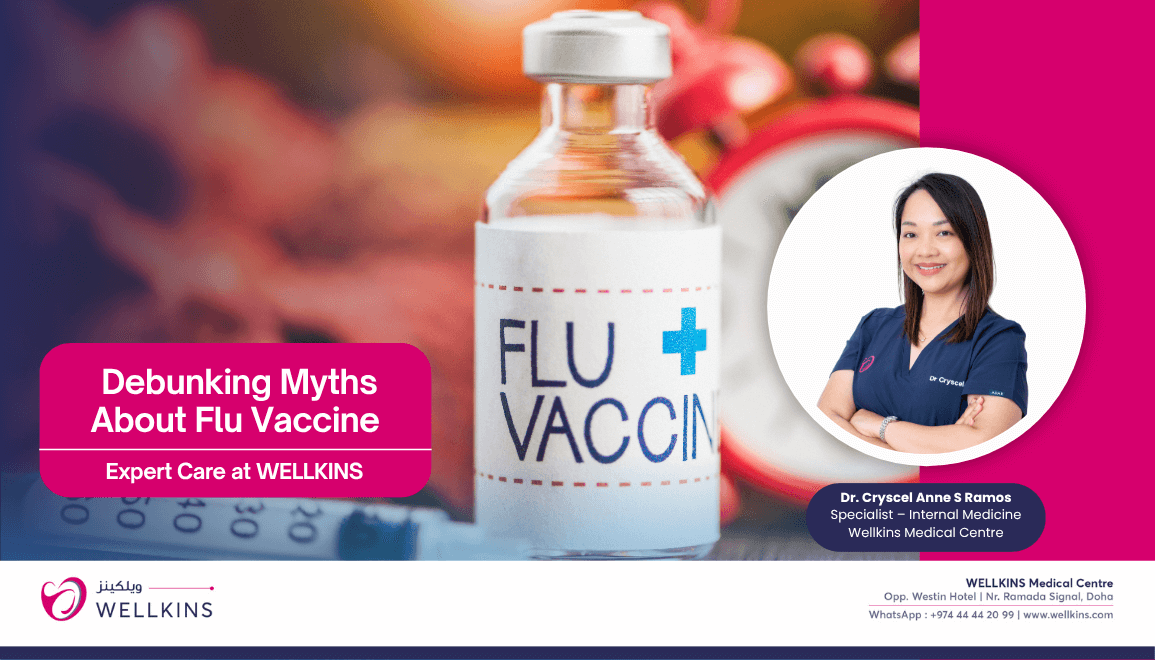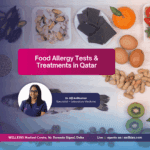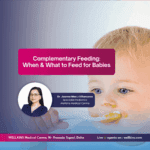Author: Dr. Cryscel Anne S Ramos (Specialist – Internal Medicine Wellkins Medical Centre)
As flu season approaches, so does the annual, critical conversation about the influenza vaccine. Unfortunately, misinformation and persistent myths often cloud the clear, scientifically backed facts about why getting your flu shot every year is a crucial, evidence based step for protecting your personal health and contributing to the collective well-being of your community. It’s time to set the record straight with clarity and confidence.
At Wellkins Medical Centre, we are deeply committed to supporting our patients with accurate, evidence-based health information and addressing every concern. Let’s thoroughly debunk some common flu shot myths and clarify precisely why annual vaccination truly matters for everyone, from infants to the elderly.
“Effective protection against influenza in Qatar relies on more than just the injection; it requires addressing multiple factors, from understanding the virus’s circulation and debunking common myths, to promoting consistent non-pharmaceutical interventions like frequent hand hygiene and respiratory etiquette, ensuring high vaccine uptake among high-risk groups and healthcare workers throughout the peak influenza season.”
What is influenza virus?
The influenza virus, commonly known as the flu, is a contagious respiratory pathogen that infects the nose, throat, and lungs, leading to symptoms more severe than a common cold, such as high fever, muscle aches, headache, and severe fatigue. Classified mainly into types A, B, C, and D, with Type A and B being responsible for the annual seasonal epidemics, the virus is highly notable for its ability to constantly mutate its surface proteins and this continuous change requires the development of a new seasonal flu vaccine each year to match the currently circulating strains. While most infections are mild, the virus poses a serious risk to vulnerable populations (including the elderly, young children, and those with chronic diseases), often leading to complications like pneumonia and, in some cases, hospitalization or death.

While we recognize the importance of annual vaccination, we also understand that hesitation often stems from confusion. Here are the facts you need to know, debunking the top myths about the flu shot.
Myth 1: The Flu Shot Gives You the Flu.
This is perhaps the most widespread, stubborn myth, and it is entirely without medical foundation. Many people confuse mild side effects with the actual disease.
The Fact: The flu shot contains either inactivated (killed) flu viruses or merely a single protein from the virus, not the live, active virus capable of causing a full blown infection. The manufacturing process ensures the virus is completely non infectious. Your body produces protective antibodies in response to these harmless components, effectively building robust immunity without the risk of illness.
The Science of Side Effects: What you might feel are often minor, short lived side effects like soreness, redness, or swelling at the injection site, a low-grade fever, mild headache, or general muscle aches. These transient symptoms are actually normal and positive signs that your immune system is vigorously responding to the vaccine, initiating the protective process by activating key cells and producing antibodies, not a sign of actual influenza infection. They typically resolve within 24 to 48 hours.
Myth 2: I Got the Flu Shot Last Year, So I’m Still Protected.
While it’s excellent that you prioritized your health previously, the flu shot isn’t a permanent immunization like the MMR or varicella vaccines; it’s a necessary, annual update.
The Fact: Influenza viruses are genetically programmed to change and mutate constantly, a phenomenon known as antigenic drift. New, genetically distinct strains emerge each year. Consequently, the World Health Organization (WHO) and international health bodies update the vaccine annually to target the three or four most prevalent strains predicted to circulate during the upcoming season. Furthermore, your immune protection from any vaccine naturally wanes over time, decreasing in effectiveness about six months after administration.
Why it Matters: Getting an annual flu shot ensures you have the absolute best, most current possible protection tailored specifically against the specific flu viruses circulating that season. Relying on last year’s vaccine means your body is fighting with outdated defenses against a new, evolved enemy, leaving you and your community vulnerable.
Myth 3: The Flu Isn’t That Serious – It’s Just a Bad Cold.
This pervasive belief leads to dangerous underestimation of the virus. While a cold is typically a mild upper respiratory issue, the flu is a serious systemic illness.
The Fact: The flu is a serious, highly contagious respiratory illness that attacks the lungs and can rapidly lead to severe and life-threatening complications, including severe pneumonia, acute bronchitis, potentially fatal myocarditis (heart inflammation), or the dangerous worsening of existing chronic medical conditions like heart disease, diabetes, or asthma. Every year, the flu is responsible for hundreds of thousands of hospitalizations and tens of thousands of deaths globally, demonstrating its severe threat, far beyond the reach of a simple cold.
Who’s Most Vulnerable: The risk is significantly amplified for young children (especially under two), pregnant women, older adults (aged 65+), and individuals with compromised immune systems or underlying chronic illnesses. For these groups, the vaccine drastically reduces the risk of being admitted to the Intensive Care Unit (ICU) and prevents flu-related mortality.
Myth 4: I’m Healthy and Never Get Sick, So I Don’t Need the Flu Shot.
Even individuals with robust health play a crucial, ethical role in public health strategy. Your vaccination is an act of community protection.
The Fact: Even if you are young and healthy and expect to experience only mild symptoms, you can still silently contract the virus and unknowingly spread it to others who are biologically more vulnerable to severe outcomes, often before you even realize you are sick. This essential concept is called “herd immunity” or community immunity.
Why it Matters: When a high percentage of the population is vaccinated, it creates a protective barrier, making it difficult for the virus to jump from person to person. This provides indirect protection for those who cannot be vaccinated (such as infants too young for the shot) or those whose weakened immune systems don’t mount a strong response to the vaccine. Your flu shot is a responsibility that protects your family, colleagues, and the wider community of Doha.
Myth 5: It’s Too Late to Get the Flu Shot.
While it is optimally best to get vaccinated early (usually by the end of October) before the virus begins to spread widely, it’s almost never too late during the course of the flu season.
The Fact: Flu season in the Northern Hemisphere typically begins to peak between December and February but can extend aggressively well into March, April, and sometimes even May. Remember, it takes approximately two weeks after vaccination for your body to fully develop the protective antibodies that confer immunity.

Why it Matters: Getting vaccinated at any point during flu season still offers valuable protection for the remainder of the season. Even in January or February, getting the shot is highly beneficial, as it protects you from late-season outbreaks and minimizes the duration and severity of any potential illness you may contract, saving you from lost workdays and potential hospitalization.
Priority for High-Risk Groups
The vaccine is especially critical for groups at high risk of severe illness and complications:
Over 50 years old: Their naturally weakening immune system makes them highly susceptible to severe illness, prolonged hospital stays, and potentially devastating health outcomes.
Children aged 6 months to five years old: Their developing immune systems put them at high risk for severe infection. They are also significant carriers, making their vaccination essential for both personal and community protection.
Pregnant women: Pregnancy changes increase their risk of severe flu. The vaccine is safe at any stage and provides dual protection, shielding both the mother and passing protective antibodies to the newborn.
People with a chronic condition or immunodepression: Conditions like diabetes, asthma, and heart disease mean the flu can trigger an acute, life-threatening crisis. The vaccine significantly reduces the severity of infection and the risk of chronic disease flare-ups.
Healthcare workers (HCWs): Due to frequent patient contact, HCWs risk contracting and unknowingly transmitting the virus to highly vulnerable patients. Vaccination is a professional responsibility that protects both themselves and the integrity of the healthcare system.
Why Annual Vaccination Truly Matters:
At Wellkins Medical Centre, we advocate for annual flu vaccination not just as a recommendation, but as a cornerstone of proactive preventive health for the community in Qatar, based on several compelling, data driven reasons:
Maximizing Personal Protection: The vaccine significantly reduces your overall risk of contracting the flu. Furthermore, if you do still get sick, it makes your illness milder, dramatically reducing the likelihood of severe complications, costly emergency room visits, or debilitating hospitalization.
Strengthening Community Protection: By choosing vaccination, you become a critical link in the chain of herd immunity. This collective action protects your loved ones, your colleagues, the elderly, and those with fragile health conditions who may not be able to defend themselves.
Reducing Healthcare Burden: High rates of widespread vaccination are vital. They prevent overwhelmed healthcare systems, reduce the strain on hospital beds and resources during the peak winter months, and ensure that medical resources are readily available for all critical medical needs across the community.
Simple, Safe and Cost-Effective: The flu shot is one of the safest, most effective, and most convenient medical interventions available. When measured against the high costs (both financial and personal) associated with a severe case of influenza including lost wages, medication costs, and potential hospital bills it is an immensely cost-effective safeguard.

Qatar’s Ministry of Public Health (MoPH) runs a free annual Seasonal Influenza Vaccination Campaign for all citizens and residents as a national health priority. This extensive program, in partnership with HMC and PHCC, ensures maximum accessibility by offering the vaccine at numerous governments and over 50 participating private facilities across the country. The campaign strategically targets and urges high risk groups including the elderly (over 50), young children (6 months–5 years), pregnant women, and people with chronic conditions to get vaccinated early. Crucially, the annual launch reinforces the scientific truth that the flu virus mutates, necessitating a new shot each year for effective protection. By participating, individuals protect themselves and contribute to the vital community protection efforts in Qatar.
Don’t let lingering myths or procrastination prevent you from making an informed, proactive decision about your health. Discuss any remaining questions or concerns openly with our healthcare professionals at Wellkins Medical Centre. We are here to provide the accurate facts and help you stay exceptionally healthy this flu season.
To book an appointment for flu vaccine at Wellkins Medical Centre; https://wellkins.com/flu






